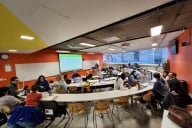You have /5 articles left.
Sign up for a free account or log in.
“Is Food Really an Academic Subject?” an article in the Guardian asked in 2003. It is in the States, where there are several academic programs in food culture, and archival food-text collections in university libraries. NYU, for instance, offers an MA in Food Studies (Culture or Systems). Tufts offers an MS or Ph.D. in a cross-disciplinary program on Agriculture, Food and Environment, in which students “learn to evaluate the ecological, political, economic and social aspects of food production and distribution.” And of course there’s the University of Mississippi’s Center for the Study of Southern Culture, with its Southern Foodways Alliance, directed by John T. Edge, who I profiled here.
 And why not food in the academy? In the Guardian article, historian Simon Schama says, “Mark Kurlansky's book, Cod, covered war, the economy and the feeding of masses of people. It takes a lot to rule food out of the historical imagination. As soon as history becomes about more than simply battles and the lines of abstract states, [food] returns.”
And why not food in the academy? In the Guardian article, historian Simon Schama says, “Mark Kurlansky's book, Cod, covered war, the economy and the feeding of masses of people. It takes a lot to rule food out of the historical imagination. As soon as history becomes about more than simply battles and the lines of abstract states, [food] returns.”
Of course Cod was written for the reading public, not just for scholars, and its accessibility might be seen as liability in the academy. The same could be said of the works of journalists such as Michael Pollan (The Omnivore’s Dilemma) and Eric Schlosser (Fast Food Nation), who’ve so successfully articulated America’s issues with food monocultures, obesity, production safety, and more. But Foucault was on it too, as usual (he and Pollan look suspiciously similar), so surely the theorists would like to have a whack at the intersection of food with class, gender, race, politics, and economics.
I started thinking about food’s place in the academy after reading and becoming addicted to the nonacademic site Four Pounds Flour: Historic Gastronomy. I don’t know Sarah Lohman, an artist writing from Queens, but I was gratified that she chose something from this blog as her epigraph. Somewhere way back when, I wrote: “I don’t know why old recipes are so evocative, since many of the ingredients are unknown to me or difficult to get, the processes laborious beyond belief, and the results, quite honestly, often nothing I’d want to eat. But they read like a poetry of lost specifics, in which you learn old words and ways to boil, bone, braise, devil, hash, jelly, pot, roast, sauce, steam, stew, and stuff…”
Lohman brings to life that nearly-lost poetry, whether it’s researching, cooking, and tasting Thomas Jefferson’s port wine pudding (inedible, as it turns out, perhaps due to 18th-century chemical additives like isinglass), or recreating the roast bear from a menu for Charles Dickens’s visit to New York (tastes like beef). For my money, the potential interest of her topic makes books about cooking one’s way through Julia Child look like pretty weak tea.
You might also peek in at Ken Albala’s Food Rant. Albala is Food Historian at the University of the Pacific in Stockton, California, and has his fingers in any number of pies, so to speak, including co-editing the journal Food, Culture and Society, and editing the Food Cultures of the World Encyclopedia, in four volumes.
Food is so vital that investigations of it transcend context and resist the specialist’s incomprehensibility. The University of Illinois at Urbana-Champaign has an online digital archive of cookbooks and other culinary topics that anyone can enjoy. In it I found the College Woman’s Cookbook, which says all sorts of interesting things about pretension, ambition, ritual, available materials, and expected cultural knowledge. Shrimp Wiggle, anyone?
Feeding America: The Historic American Cookbook Project, in the digital collections of the Michigan State University Libraries, is an excellent resource and is included in the Library of Congress’s online collection.
The Fales Collection, in NYU’s media archive, lets you watch videotaped panel discussions on sustainable agriculture, the rise of food writing, and a celebration of cheese.
The University of California Press has its series California Studies in Food and Culture, which “considers the relationship between food and culture from a range of disciplines and approaches including anthropology, sociology, history, economics, philosophy, and women's studies.” Titles include Tastes and Temptations: Food and Art in Renaissance Italy; Perfection Salad: Women and Cooking at the Turn of the Century; and Meals to Come: A History of the Future of Food.
Finally—for now—Johnson & Wales University posted this list of culinary bibliographies from sources as far-flung as Boston University Libraries and University of Western Australia (Perth).





